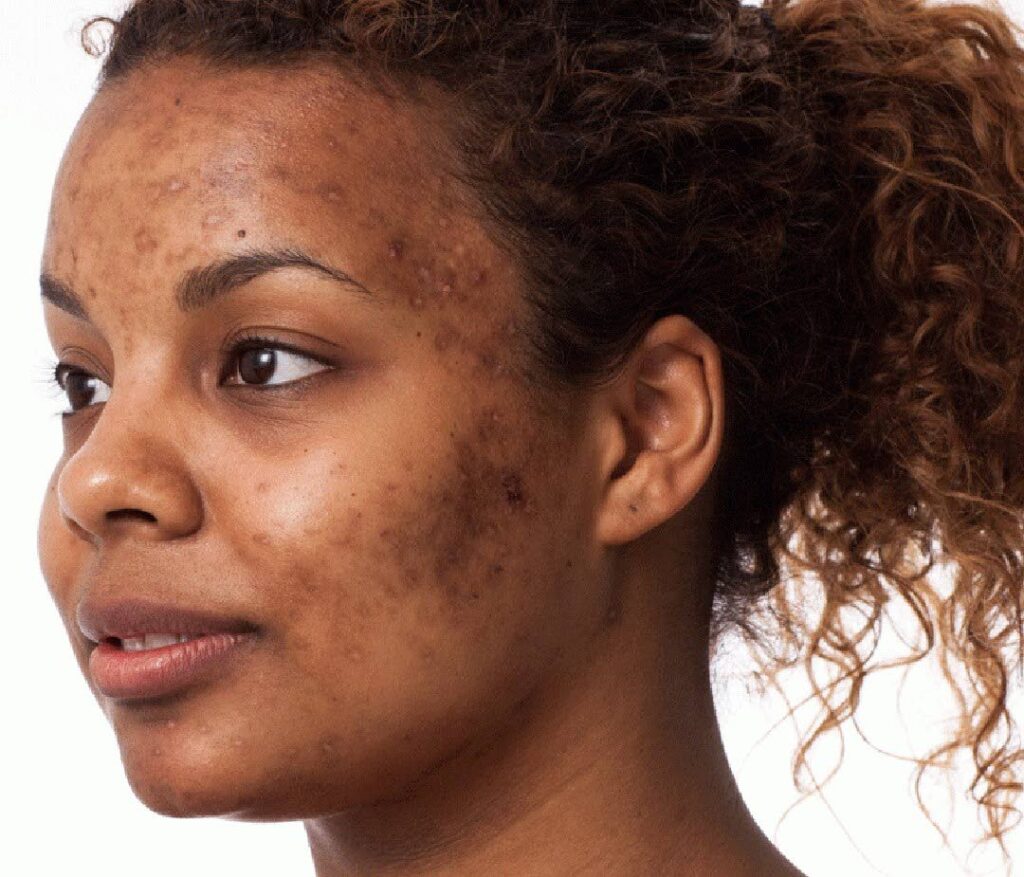Dealing with acne

DR MAXWELL ADEYEMI
Acne is a very common skin condition that causes pimples. There are a variety of causes including genetics, fluctuating hormone levels, stress, high humidity and using oily or greasy personal care products. Acne commonly affects teenagers but can occur at any age.
Acne occurs when the pores of your skin become blocked by hair, sebum (an oily substance), bacteria and dead skin cells. Those blockages produce blackheads, white heads, nodules and other types of pimples. It is the most common skin condition that people experience. It is estimated that 80 per cent of people ages 11 to 30 will have at least a mild form of acne, and most people are affected by it at some point in their lives. This condition can be a source of stress, low self-esteem and significant psychological issues especially in teenagers and females.
Though it mainly affects teenagers and young adults undergoing hormonal changes, many people continue struggling with acne into their 20s, 30s and beyond. Some even develop acne for the first time as adults.
Common sites
The most common spots where you might have acne are your face, forehead, chest, shoulders and upper back. Oil glands are all over your body, but those are the places where there are the most. Acne can be mild (a few occasional pimples), moderate (inflammatory papules), or severe (nodules and cysts).
Types of acne
Acne can take several forms. They include:
• Blackheads: Open bumps on the skin that fill with excess oil and dead skin. They look as if dirt has deposited in the bump, but the dark spots are actually caused by an irregular light reflection off the clogged follicle.
• White heads: Bumps that remain closed by oil and dead skin.
• Papules: Small red or pink bumps that become inflamed.
• Pustules: Pimples containing pus. They look like whiteheads surrounded by red rings. They can cause scarring if picked or scratched.
• Fungal acne: This type occurs when an excess of yeast develops in the hair follicles. They can become itchy and inflamed.
• Nodules: Solid pimples that are deep in your skin. They are large and painful.
• Cysts: Pus-filled pimples. These can cause scars.

Causes of acne
Acne is largely a hormonal condition that’s driven by androgen hormones, which typically become active during the teenage and young adult years. Sensitivity to these hormones combined with surface bacteria on the skin and fatty acids within oil glands can result in acne.
Certain things can cause acne or make it worse:
• Fluctuating hormone levels around the time of a woman’s period.
• Picking at acne sores.
• Clothing and headgear, like hats and sports helmets.
• Air pollution and certain weather conditions, especially high humidity.
• Using oily or greasy personal care products like heavy lotions, creams or hair pomades and waxes or working in an area where you routinely come in contact with grease, such as working at a restaurant where there are greasy food surfaces and frying oil.
• Stress, which increases the hormone cortisol, can also cause acne to flare.
• Some medications may trigger acne.
• Genetics can predispose to acne.
Some studies have linked particular foods and diets to acne. Skim milk, whey protein and diets high in sugar may contribute to acne flares.
One of the causes of acne is a surge in hormones called androgens (specifically testosterone), which both women and men produce. Those hormones tend to be at their peak during the teen years hence acne is commoner in teenagers.
Severity of acne
• Grade 1 (mild): mostly whiteheads and blackheads, with a few papules and pustules.
• Grade 2 (moderate, or pustular acne): multiple papules and pustules, mostly on your face.
• Grade 3 (moderately severe, or nodulocystic acne): numerous papules and pustules, along with occasionally inflamed nodules. The back and chest may also be affected.
• Grade 4 (severe nodulocystic acne): numerous large, painful and inflamed pustules and nodules.
Treatment
Non-prescription medications are widely used by many persons. Depending on the severity, your age, the type of acne you have and how effective the over-the-counter remedies have been, you may need stronger prescription medications and other agents.
The use of certain contraceptives can sometimes help a woman’s acne go away. Birth control pills that contain a combination of estrogen (the primary female sex hormone) and progesterone (a natural form of steroid that helps regulate menstruation) are often used.
Benzoyl peroxide is available as a leave-on gel or wash. It targets surface bacteria, which often aggravates acne. Lower concentrations and wash formulations are less irritating to your skin.
Salicylic acid as a cleanser or lotion. It helps remove the top layer of damaged skin. Salicylic acid dissolves dead skin cells to prevent your hair follicles from clogging.
Azelaic acid is a natural acid found in various grains such as barley and wheat. It kills microorganisms on the skin and reduces swelling.
Retinoids (vitamin A derivatives) break up blackheads and whiteheads and help to prevent clogged pores, the first signs of acne. They are used on the entire area of skin affected by acne to prevent the formation of new pimples.
Antibiotics (topical types include clindamycin and erythromycin) control surface bacteria that aggravate and often encourage the swelling of acne. Antibiotics are more effective when combined with benzoyl peroxide.
Dapsone is a topical gel, which also has antibacterial properties, can be used for inflamed acne.
Steroids. Rarely, steroids can be used to treat severe acne or injected into large nodules to reduce inflammation.
Lasers. Currently, lasers are primarily used to treat acne scars. A laser delivers heat to the scarred collagen under the skin, this relies on the body’s wound healing response to create new, healthy collagen. This encourages the growth of new skin to replace it.
Chemical peels. This treatment uses special chemicals to remove the top layer of old skin. Typically, whenever the top layer is removed, the new skin that grows in is smoother and can lessen acne scars.
Most cases of acne can be treated by your family doctor. However, in some severe cases you may need to see a dermatologist.
Contact Dr Maxwell on 363-1807 or 757-5411.

Comments
"Dealing with acne"